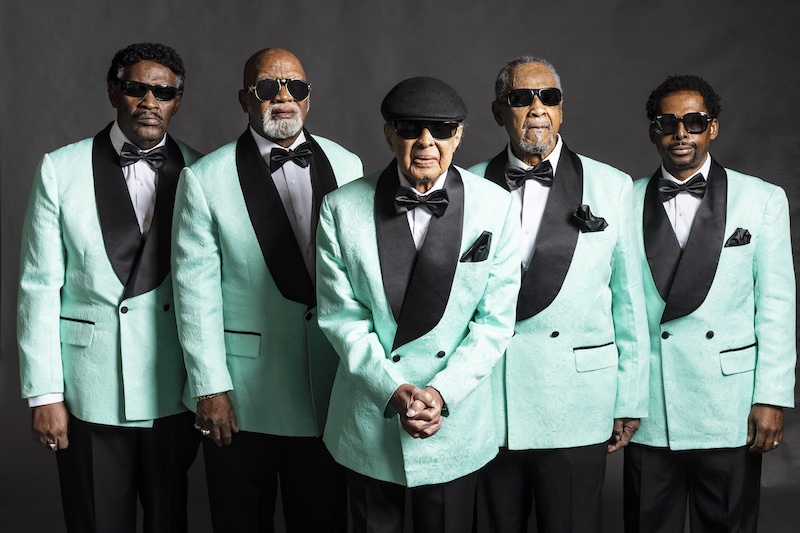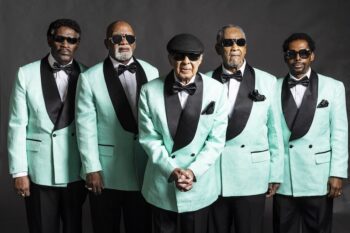

The BLIND BOYS OF ALABAMA story began in Talladega, Alabama in 1939 and they’ve been traveling down the Gospel Highway ever since. Flash forward to 2024 when they picked up their sixth career GRAMMY Award and have their definitive memoir coming out on March 19 via Hachette Books. The Blind Boys of Alabama have been a pillar of American music for most of the last century and continue to stay relevant and active to this day.
In the eight decades since the Blind Boys of Alabama first began singing together, America has witnessed a World War, the civil rights movement, and the Summer of Love; the moon landing, Vietnam, and the fall of the Berlin Wall; JFK, MLK, and Malcolm X; the invention of the jukebox, the atomic bomb, and the internet. Through it all, the Blind Boys’ music has not only endured, but thrived, helping both to distinguish the sound of the American south and to push it forward through the 20th century and well on into the 21st. The group has the rare distinction of being recognized around the world as both living legends and modern-day innovators. They are not just gospel singers borrowing from old traditions; the group helped to define those traditions in the 20th century and almost single-handedly created a new gospel sound for the 21st. Since the original members first sang together as kids at the Alabama Institute for the Negro Blind in the late 1930s, the band has persevered through eight decades to become one of the most recognized and decorated roots music groups in the world.
Hailed as “gospel titans” by Rolling Stone, the Blind Boys of Alabama defied the considerable odds stacked against them in the segregated south, working their way up from singing for pocket change to performing for three different American presidents. Inducted into the Gospel Music Hall of Fame in 2003, the group has won six Grammy Awards for their albums (plus a Grammy Lifetime Achievement Award), received a National Heritage Fellowship from the National Endowment for the Arts, and collaborated with artists as diverse as Mavis Staples, Stevie Wonder, Chrissie Hynde, Lou Reed, Tom Waits, Peter Gabriel, Bonnie Raitt, and Bon Iver. Beyond the group’s considerable commercial success, the artistic influence the Blind Boys imparted onto their contemporaries and the generations of gospel, rock, and soul singers who followed is immeasurable. The New York Times explained that in their earlier years, the band “came to epitomize what is known as jubilee singing, a livelier breed of gospel music,” adding that “they made it zestier still by adding jazz and blues idioms and turning up the volume, creating a sound…like the rock ‘n’ roll that grew out of it.” TIME raved that the group has always been “hunting for—and finding—the perfect note or harmony that lifts an old tune into the sublime,” while The Washington Post praised their “soul-stirring harmonies” and “cross-genre collaborations,” and The New Yorker simply dubbed them “legendary.”
The Blind Boys are going stronger than ever, with GRAMMY winning albums, worldwide touring, television specials, and they’re soon-to-be published book. They star in the PBS Special “A Symphony Celebration: The Blind Boys of Alabama with Dr. Henry Panion, III,” currently airing nationwide back-to-back as a companion to the Henry Louis Gates Jr. limited series “Gospel” on PBS. The special features the group performing alongside a full symphony orchestra and a 300-member choir from Alabama’s Historically Black Colleges and Universities. 2024 will also see the publication of their memoir SPRIIT OF THE CENTURY: Our Own Story (Hachette Books, 3/19/24). Written with Preston Lauterbach, the book rounds up all surviving members of the group across its several iterations, along with key musical contributors, to tell their own story completely and for the first time. It also draws from the group’s private archive. As a result, the book offers a unique and intimate perspective on the group’s evolution and enduring success.
They recently took home the 2024 GRAMMY Award for Best Roots Gospel Album for Echoes Of The South, their first album in six years and combines some of the traditional spirituals and long-lost gospel classics that first inspired them to sing together with timeless soul and R&B tunes made famous by the likes of Stevie Wonder, Curtis Mayfield, and Pops Staples. Recorded and mixed by Matt Ross-Spang (Jason Isbell, Old Crow Medicine Show) and Ben Tanner (Alabama Shakes, John Paul White), the collection is as moving as it is enduring, transcending genre and era to touch something deep and fundamental about the human condition. These are songs of love and friendship, joy and gratitude, faith and perseverance. Uplifting as they are, the recordings can feel bittersweet at times, too: Jimmy Carter retired from performing following the sessions, while two longtime members, Paul Beasley and Benjamin Moore, Jr., have since passed away. Despite the losses, the Blind Boys of Alabama show no signs of slowing down.
While the Blind Boys recording career stretches back to the 1940s and thereafter experienced the rise and fall of Gospel music, at the dawn of the new millennium came a rebirth, with a string of Grammy winning releases and a dynamic group of collaborators. In 2001, they released Spirit of the Century on Peter Gabriel’s Real World label, mixing traditional church tunes with songs by Tom Waits and the Rolling Stones, and won the first of their Grammy Awards. The next year they backed Gabriel on his album Up and joined him on a world tour. Shortly thereafter, David Simon chose their cover of Waits’ “Way Down in the Hole” as the theme song for the first season of HBO’s acclaimed series The Wire. Subsequent albums included collaborations with the likes of Willie Nelson, Ben Harper, Mavis Staples, Robert Randolph, Aaron Neville, Patty Griffin, The Preservation Hall Jazz Band, and the late Allen Toussaint.
In 2013 came the release I’ll Find A Way, a powerful collection of gospel and spiritual songs new and old, featuring some of the Blind Boys’ most fervent vocals as well as contributions by a new generation of Blind Boys fans, including Justin Vernon (also known as Bon Iver) and Merrill Garbus (also known as Tune-Yards). In 2014 the Blind Boys released Talkin’ Christmas!, a collaboration with Grammy winning blues legend Taj Mahal, that continued the band’s streak of creating original and unique work. It includes new versions of Christmas standards, covers of hidden gospel gems, and seven brand-new holiday songs featuring Money Mark on keyboards, Taj Mahal on vocals and songwriting collaborations with Stax Records soul legend William Bell. Leading to their recent Grammy winning album they recorded a few songs with blind Malian couple Amadou & Mariam and garnered back-to-back Grammy nominations for a collaboration with Béla Fleck on the Nina Simone song “I Wish I Knew How It Would Feel To Be Free” and another with Black Violin for the original song “The Message.”
The Blind Boys’ live shows are roof-raising musical events that appeal to audiences of all cultures, as evidenced by an international itinerary that has taken them to nearly every continent. On tour they have performed on some of the world’s most prestigious stages, including with music icons like Stevie Wonder, Prince, Tom Petty, and Lou Reed. The Blind Boys of Alabama have attained the highest levels of achievement in a career that spans over 75 years and shows no signs of diminishing. “When the Blind Boys started out, we weren’t even thinking about all these accolades and all that stuff,” founding member Jimmy Carter told NPR. “We just wanted to get out and sing gospel and tell the world about gospel music.” Mission accomplished!